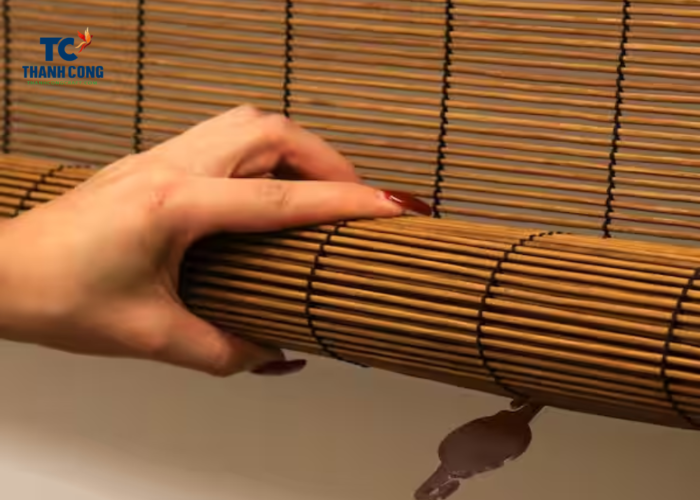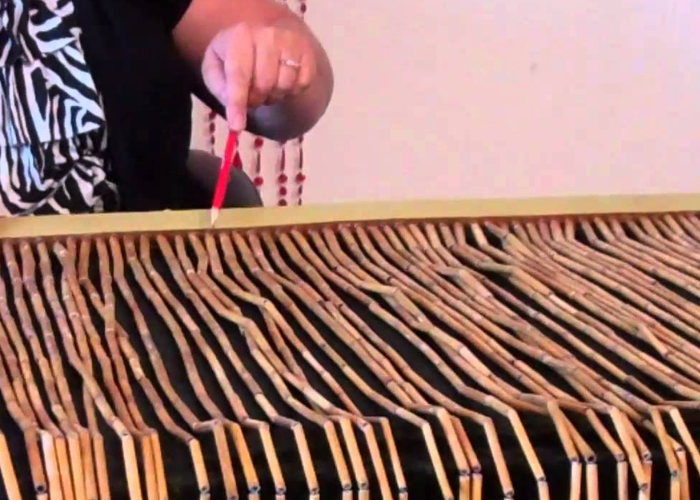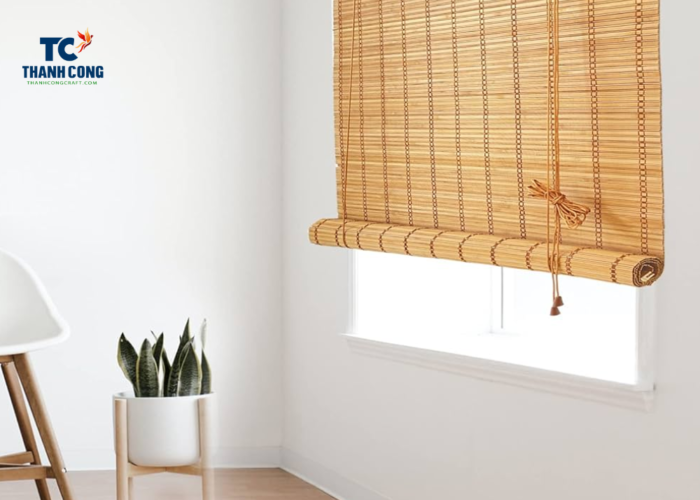Bamboo, known for its soft, durable, and easily processable nature, serves as a versatile plant material that can be utilized for various products, including blinds (aka bamboo bamboo shades, bamboo curtains). Bamboo blinds present a beautiful, cost-effective, and environmentally friendly solution for home decoration. In this article, we will guide you on how to make bamboo blinds.
Contents
1. How to make bamboo blinds roll up?
Bamboo blinds are a type of curtain made from bamboo, which can be rolled up or folded down to adjust the light and space. To make bamboo blinds more private, you need some tools and materials as follows:
- Bamboo curtain that is ready-made or made from bamboo strips;
- Wooden bar that is equal to the width of the curtain;
- Smaller wooden bar to make a handle;
- Electric drill and screws;
- Piece of rope or cable;
- Lock or hook to fix the curtain when rolled up.

The steps are as follows:
- Start by attaching the long wooden bar to the top of the bamboo curtain with screws, to create stiffness for the curtain and prevent warping. Next, attach the small wooden bar to one end of the long wooden bar, to make a handle to pull the curtain up and down.
- Then, drill small holes on the long wooden bar, spaced evenly about 20 cm apart, to thread the rope or cable through. Pull the rope through the holes, then tie it tightly to the bottom of the bamboo curtain, so that each strand of rope connects to a row of bamboo. Finally, attach the lock or hook to the wall or window, so that you can clip the curtain when rolled up.
To roll up the curtain, you just need to pull the handle upwards, then clip the curtain to the lock or hook. To fold down the curtain, you just need to release the curtain from the lock or hook, then let it fall down. You can adjust the height of the curtain as you wish.
Bamboo blinds are a beautiful and convenient type of curtain, suitable for many living spaces. You can make bamboo blinds roll up with low cost and short time.
2. How to make bamboo beaded curtains?
Bamboo beaded curtains are a type of curtain made from small bamboo beads strung together. They can create a beautiful, cozy and natural space for your home. To make bamboo beaded curtains, you need to prepare the following materials:
- Dry, clean and sturdy bamboo sticks;
- A drill;
- Rope or nylon thread to string the bamboo stalks;
- Clips or hooks to hang the curtain.

The steps are as follows:
Step 1:
Cut the bamboo into small stalks, with a leghth of 5 cm. You can use a knife, scissors or a saw to cut. Pay attention to the uniform size of the bamboo beads to make the curtain look more beautiful.
Step 2:
String vertically the bamboo stalks into strands. You can use rope or nylon thread to string, depending on your preference and style. You should tie the ends of the thread tightly to prevent the beads from slipping off.
Step 3:
Hang the curtain in the desired position. You can use clips or hooks to hang the curtain on a bamboo or iron rod. You should choose a position with natural light to create a sparkling effect when light shines through.
3. Where can I use bamboo blinds?
Bamboo blinds are versatile and can be used in various spaces throughout your home. Some suitable places to use bamboo blinds in your home are:
- Living room: Bamboo blinds create a cozy and natural space in the living room. They filter the sunlight, creating a comfortable and friendly atmosphere.
- Bedroom: Bamboo blinds help you create a peaceful and relaxing space in the bedroom. They have a natural texture, bringing a touch of elegance, and have the ability to filter the light, helping you have a good sleep.
- Rest room or porch: You can use bamboo blinds in the restroom or on the porch to adjust the light and increase privacy, while still keeping the connection with nature.
- Kitchen: Bamboo blinds are a great choice for the kitchen. They bring a natural element to the space and are easy to clean, making them a practical choice.

- Home office: Make your home office more lively with bamboo blinds, creating a peaceful atmosphere, promoting concentration and efficiency.
- Bathroom: Bamboo blinds are also suitable for the bathroom, creating a spa-like space. Make sure they are treated to withstand moisture if used in this space.
- Dining area: Install bamboo blinds in the dining area to regulate the light during meals and create a comfortable dining experience.
- Children’s room: Bamboo blinds can be a beautiful and safe choice for a children’s room. They are durable and bring natural beauty.
- Entrance: Use bamboo blinds in the entrance to add a friendly touch and control the amount of light into your home.
- Outdoor space: You can consider bamboo blinds for spaces such as pergola, gazebo, or patio. They can provide shade and a tropical feel for your outdoor living areas.
When choosing bamboo blinds, make sure they fit the specific conditions of each space. For example, if exposed to moisture, choose blinds that are treated to be waterproof. Also, consider the style and color of the blinds to match with
4. FAQs
4.1 What is another name for bamboo blinds?
Another name for bamboo blinds is bamboo curtains or bamboo shades are often used interchangeably to describe window coverings made from bamboo materials. Bamboo blinds have many advantages such as: easy to adjust the brightness, create a sense of closeness to nature, suitable for many different interior styles.
Bamboo blinds also come in various colors and sizes for you to choose according to your preferences and space.
4.2 What are the disadvantages of bamboo blinds?
Bamboo blinds are a popular choice for those looking to create a warm and natural ambiance indoors. However, bamboo blinds also come with some drawbacks that you should be aware of before deciding to use them. Here are some disadvantages:
- Bamboo blinds may fade or deteriorate when exposed to direct sunlight or prolonged high humidity. This can reduce their lifespan and aesthetics.
- Bamboo blinds may not completely block out light, making them unsuitable for rooms that require complete darkness, such as bedrooms or home theaters. If you want to enhance their sun-blocking ability, you can pair them with fabric curtains or blackout shades.
- Bamboo blinds can generate noise when the wind blows or when you raise or lower them. This can be bothersome, especially at night.
- Bamboo blinds can be challenging to clean and maintain due to their numerous gaps and grooves, which easily collect dust and bacteria. Regular cleaning with a damp cloth or a vacuum cleaner is necessary, and strong cleaning agents should be avoided.
4.3 How long do bamboo blinds last?
On average, well-maintained bamboo blinds can last anywhere from 5 to 10 years. The lifespan of bamboo blinds can vary depending on several factors, including the quality of the bamboo, environmental conditions, and how well they are maintained.
High-quality bamboo and proper care, such as regular cleaning and protection from direct sunlight or excessive moisture, can contribute to an extended lifespan.
However, exposure to harsh elements may lead to fading, brittleness, or other signs of wear over time. Regular inspections and maintenance can help prolong the life of bamboo blinds
4.4 Do bamboo shades get moldy?
Yes, bamboo shades can potentially get moldy, especially if they are exposed to high humidity or damp conditions for an extended period. Bamboo is a natural material, and like any organic substance, it is susceptible to mold growth in the presence of moisture.
To prevent mold, it’s essential to keep bamboo shades dry and well-ventilated. Avoid placing them in areas with high humidity, such as bathrooms, and ensure proper ventilation to minimize the risk of mold development. Regular cleaning and maintenance can also help prevent mold growth on bamboo shades.
If mold does appear, prompt cleaning with a mild solution of water and vinegar or an anti-mold cleaner is recommended.
4.5 Do bamboo blinds block out light?
While bamboo blinds provide some level of light filtering, they may not block out light entirely. Bamboo blinds are designed to allow a soft, diffused light to enter the room, creating a warm and natural ambiance. However, the extent to which they block light depends on factors such as the thickness of the bamboo, the tightness of the weave, and the specific design of the blinds.
If you require more light control, it’s advisable to choose bamboo blinds with a tighter weave or consider pairing them with blackout curtains or liners. This combination can enhance their light-blocking capabilities, providing better privacy and darkness, particularly in spaces like bedrooms or home theaters where complete light control is desired.
If you have any further questions, don’t hesitate to send thanhcongcraft an email us at [email protected] or message us at WhatsApp: +84967485411. Hope to serve you soon! Best regard!


